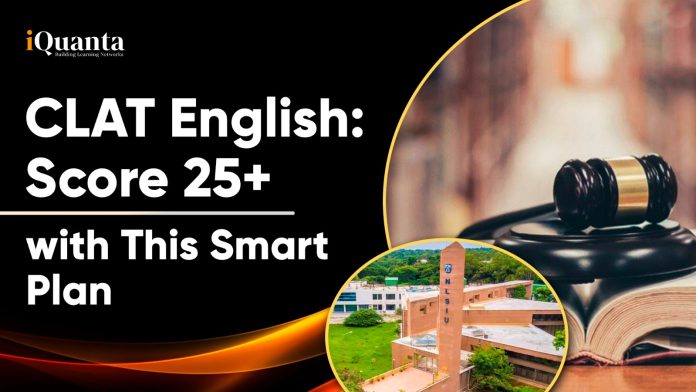The aspiring candidates for the Common Law Admission Test must be aware that the English Language section is often perceived as a high-scoring section. However, maximising your potential in this section will require you to prepare a smart yet focused preparation blueprint. Candidates will need to analyse the past papers to understand the pattern of the English Language section and score effectively in the comprehension. This blog aims to break down the previous trends, preparation strategies, and ways to maximise your score in the examination. This will help you unlock a significant advantage in the CLAT 2026 Examination and score 25+ in the English Language section.

CLAT English Language Section
The CLAT English Language section primarily comprises comprehension and grammar-based questions. The weightage of this section in the examination is around 22% and comprises roughly 22-26 questions in the Question Paper. A detailed analysis of the probable typology of the questions is given below:
- Reading Comprehension: This is added to the question paper to assess the candidate’s ability to pick out the central theme, arguments and draw inferences from the long comprehension-based data. The passages can be diverse areas such as politics, economy, literature and much more.
- Vocabulary Knowledge: This tests the candidate’s knowledge and depth of words, their meanings, antonyms and synonyms. This helps build a deeper knowledge of new words.
- Foundational Grammar: This is to make the candidates understand and learn about the foundational English grammar rules, such as articles, prepositions, conjunctions, subject-verb agreement, etc.

Previous Year’s Paper Analysis
Check below the previous year analysis of the CLAT exam paper:
| Year Conducted | Total Number of Questions | Overall Difficulty Level | Topics Included | General Observations |
| 2024 | 24 | Easy-Moderate | Reading Comprehension is based on the education system and fiction. Vocabulary including word meanings and general grammar featuring subject-verb agreement. | The passage tested the candidates’ reading ability, and the vocabulary asked for direct word meanings. |
| 2023 | 22 | Easy-Moderate | Reading Comprehension based on social sciences and current events. Vocabulary including synonyms, antonyms, and general grammar, featuring error spotting and sentence correction | The number of questions in the English Language section was reduced, and the level of the paper was easier. The grammatical questions focused on the correct use of tenses and identifying errors. |
| 2022 | 24 | Moderate-Difficult | Reading Comprehension based on philosophy and literature. Vocabulary including contextual meanings, and general grammar featuring articles, prepositions and sentence structure | The passages were more analytical and required in-depth knowledge of comprehension. Grammatical questions required the correct use of articles and prepositions. |
| 2021 | 28 | Easy-Moderate | Reading Comprehension based on legal themes and editorials. Vocabulary including idioms and phrases, and general grammar featuring tenses and subject-verb agreement. | The level of reading comprehension was reduced, and it was easier to understand. Vocabulary tested the candidates’ understanding of common idioms and phrases. |
| 2020 | 30 | Moderate | Reading Comprehension based on current affairs and social issues. Vocabulary including synonyms, antonyms, and general grammar, featuring error spotting and sentence correction. | The passages were moderately long as compared to other years, and the grammatical section emphasised foundational rules. |
Preparation Strategies
Achieving 25+ in the English Language section requires the right preparation strategy with a consistent approach. Mentioned below are some tips to help the candidates prepare effectively for the English Language section, specifically in the CLAT 2026 Examination.
- Develop a daily reading habit: Read daily newspapers and magazines on different topics such as economics, political events, science, etc to improve your comprehension skills, reading speed and accuracy. Read from famous newspapers such as The Hindu, Indian Express, LiveMint, etc.
- Update your vocabulary daily: Try learning a minimum of 5 words daily to keep updating your vocabulary. Journal down the new words daily, along with their antonyms and synonyms, and use flashcards to memorise them. Understand and learn the usage of words in the sentence. Familiarise yourself with the regularly used Idioms and Phrases as they frequently occur in the examination.
- Learn foundational grammar: Learn the basic rules of English Grammar, such as tenses, articles, prepositions, conjunctions, pronouns, subject-verb agreement, etc. Regularly practice the usage of grammar by solving exercises. Slowly start applying the correct usage of grammar in your daily life, and also while solving exercises.
- Practice Reading Comprehensions: Try solving reading comprehension questions from multiple topics such as economics, history, geography, and political events. Practice factual-based questions, inference-based questions, and vocabulary-based questions to test your knowledge of the comprehension read. Time yourself while solving such comprehension.
- Appear for Mock tests and previous years’ papers: Solve the previous year’s papers along with mock test papers to build your confidence over time. This will help build a similar exam-like situation. Identify your mistakes through mock tests and strengthen your weak areas. Aim to spend 20-25 minutes on the English language section and not more than that.

FAQs
Aspiring candidates must allocate at least 1-1.5 hours to the English Language preparation daily. Revise grammar, vocabulary and practice reading comprehension during this period.
The recommended resources for English Language preparation in the CLAT Examination are:
– Word Power Made Easy by Norman Lewis
– High School English Grammar and Composition by Wren and Martin
– Objective General English by S.P. Bakshi or R.S. Aggarwal
The core grammatical includes tenses, subject-verb-agreement, prepositions, articles, conjunctions, common errors and sentence correction. All these are important topics from the exam point of view.
Candidates willing to improve their reading skills must read newspapers and editorials, look up the meanings of new words and maintain a vocabulary journal. They can also practice using flashcards and try using the new words in their conversations.
Mock tests are extremely beneficial for the candidates before the examination as they provide an overview and feel of the real examination. The mistakes committed in the mock tests will help you identify your weak areas.

